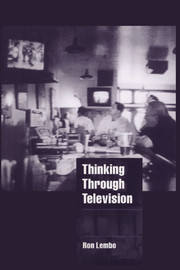Book contents
- Frontmatter
- Contents
- Acknowledgments
- Introduction: Situating my experience with television
- PART I Conceptions of television use
- 1 Social theory
- 2 Social science
- 3 Cultural studies
- PART II Reconceptualizing television use
- PART III Documenting the viewing culture
- Conclusion: The politics of television reconsidered
- References
- Index
2 - Social science
Published online by Cambridge University Press: 22 September 2009
- Frontmatter
- Contents
- Acknowledgments
- Introduction: Situating my experience with television
- PART I Conceptions of television use
- 1 Social theory
- 2 Social science
- 3 Cultural studies
- PART II Reconceptualizing television use
- PART III Documenting the viewing culture
- Conclusion: The politics of television reconsidered
- References
- Index
Summary
In contrast to the work of media theorists, social-science researchers have proceeded inductively, replacing questions about broad-based historical changes or notions of societal power with a research-based scientific language of “problems.” This analytical agenda has called for the specification of hypothesized relations between a given medium, usually a particular aspect of it, and one or another dimension of the subjective experience or behavior of the people who use it. The primary goal of social-science research has been to develop ever more precise techniques of measurement, and this, in turn, has led to a search for conceptual precision. In this tradition, researchers have sought an empirical test for hypothesized problems in the variations in data along specified dimensions of media effects or use among discrete users or whole audiences. By these means, social science has attempted to scientifically “validate” ideas about media power or the subjective dimensions of use, seeing this as forming a basis for generalizations and, ultimately, theories of television or the mass media generally.
Variable analysis techniques have provided an exactness to social science research that is unmatched by any other approaches to media studies. And yet, it is this very “scientificness” that has limited the vision of analysts in understanding and documenting power, meaning, and, most importantly, the sociality that comprises the distinctive cultures that emerge from television use.
- Type
- Chapter
- Information
- Thinking through Television , pp. 31 - 52Publisher: Cambridge University PressPrint publication year: 2000

